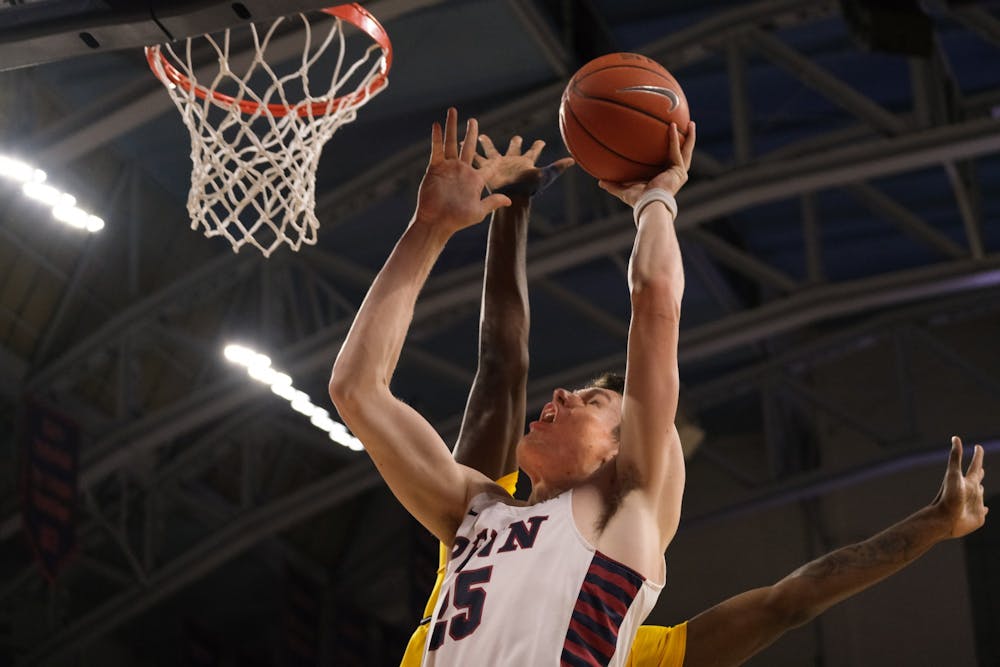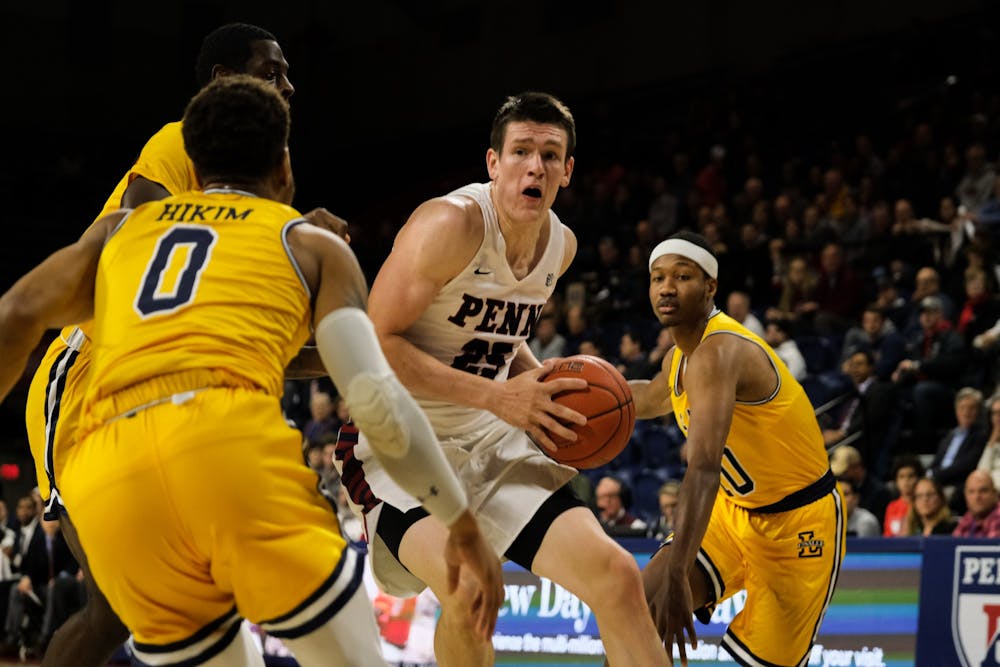
Senior forward AJ Brodeur and Penn men's basketball have eight of their first nine games this year on the road.
Credit: Son NguyenEight of Penn men’s basketball’s first nine games are away from the Palestra, and it’s having some important effects on the players.
For freshmen, the transition from high school to college basketball is already immense. The players are bigger, stronger, and more mature. For players that might have been the best on every team they’ve ever been on, this is now no longer the case. Additionally, the travel is different. School buses suddenly become planes.
“Going on these long road trips is a blessing and a curse," senior forward AJ Brodeur said. “We’re big guys and sitting on these cramped busses, cramped planes for hours at a time, no one likes to do that.”
While their schedule is front-loaded with away games, the Quakers are playing a disproportionate number of games away from the Palestra. Overall, they’re playing 16 away games, compared with just 11 at home.
“I don't remember having this many away games in the last few years,” Brodeur said.
Teams typically perform better at home. Last year, Penn went 10-4 at home, 8-5 in away games, and 1-3 at neutral sites. So far this year, they’re 1-0 at home and 1-2 when away.
“I always say I’m willing to play anybody that’s willing to come here [to the Palestra]. There just aren’t a lot of teams that are willing to do that,” coach Steve Donahue said.
Ivy League basketball is excellent right now. It is currently ranked the 10th most competitive conference in the country according to RPI, which used to be considered by the NCAA Tournament Selection Committee during the selection and seeding process. At the beginning of the year, it wasn't inconceivable that the Ivy League could send two teams to the NCAA Tournament, and that’s reflected in Penn’s schedule.

Senior forward AJ Brodeur
“If you’re going to get a second team in the tournament, it’s going to have to be a team with a great resume,” Donahue said. “Some of [the tough road games] are by design.”
Donahue theorizes that to get to the NCAA Tournament without winning the Ivy League Tournament, Penn will need to have some high-quality nonconference wins. Their resume will have to speak for itself come March.
Beyond the court, front-loading this many away games can have some important effects on the team. Firstly, it can affect academics.
“Last year, [school] definitely was a big transition for me. It took a lot of time to catch up,” sophomore guard Bryce Washington said. “But we have a lot of helpful coaches and teammates, and also have teachers that understand it’s hard for a freshman, especially at a school like this.”
As a result of that, the Penn coaching staff thought a lot about the schedule and how it interacts with academics. The Quakers played at Alabama on a Tuesday two weeks ago to begin the season. That Saturday, they played at Rice in Houston. It would have made more sense, at least from a basketball standpoint, to fly straight from Alabama to Houston. It would subject the team to less travel, less time sitting on a cramped plane. That’s not what happened.
Rather than remain away from home, Donahue and his staff elected to fly back to Philadelphia. That way, the team didn’t miss two days of class.
Secondly, front-loading this many away games can allow the team to bond. Last year, the Quakers endured 20 hours of delays on their return trip from the U.S. Virgin Islands. They passed the time with pizza, music, and wheelchair racing. This year, no such delay has occurred, but the bonding is still there.
“Getting to spend all that time with these guys, everyone loves it. We have great times together hanging out in airports,” Brodeur said.
Through all this extra time on the road, the Red and Blue have tried to adjust both on and off the court. They’ve pinpointed their favorite eating spots in their regular American Airlines terminal, and they’ve bonded. Their next chance to play at home comes on Dec. 21. By then, they’re hoping to have adjusted fully.
The Daily Pennsylvanian is an independent, student-run newspaper. Please consider making a donation to support the coverage that shapes the University. Your generosity ensures a future of strong journalism at Penn.
Donate






